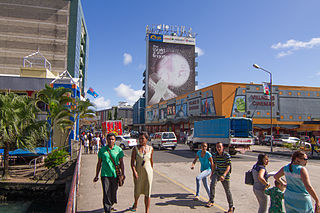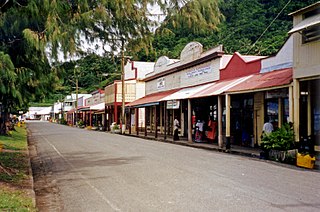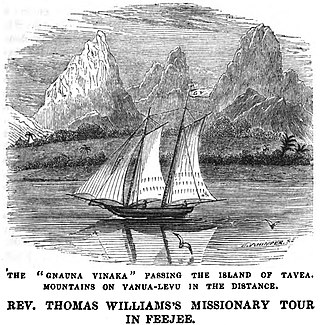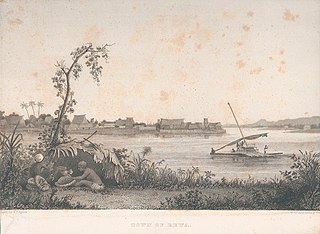
Suva is the capital and the most populous city of Fiji. It is the home of the country's largest metropolitan area and serves as its major port. The city is located on the southeast coast of the island of Viti Levu, in Rewa Province, Central Division.

Nadi is the third-largest conurbation in Fiji. It is located on the western side of the main island of Viti Levu, and had a population of 42,284 at the most recent census, in 2007. A 2012 estimate showed that the population had grown to over 50,000. Nadi is multiracial with many of its inhabitants Asians, Indian or Indigenous Fijians, along with a large transient population of foreign tourists. Along with sugar cane production, tourism is a mainstay of the local economy.

Fiji is divided administratively into four divisions, which are further subdivided into fourteen provinces. Each province has a provincial council.

Lautoka is the third largest metropolitan area in Fiji. It is on the west coast of the island of Viti Levu, in the Ba Province of the Western Division. Lying in the heart of Fiji's sugar cane-growing region, the city has come to be known as the Sugar City. Covering an area of 32 square kilometres, it had a population of 71,573 at the 2017 census, the most recent to date.

Savusavu is a town in the Fijian Province of Cakaudrove. The town is located on the south coast of Vanua Levu Island and had a population of 3,372 in the 2007 census.

Labasa is a town in Fiji with a population of 28,500 at the 2010 census.

Levuka is a town on the eastern coast of the Fijian island of Ovalau, in Lomaiviti Province, in the Eastern Division of Fiji. Prior to 1877, it was the capital of Fiji. At the census in 2007, the last to date, Levuka town had a population of 1,131, about half of Ovalau's 8,360 inhabitants. It is the economic hub and the largest of 24 settlements on the island. Having been nominated decades prior, Levuka was designated a UNESCO World Heritage Site in June 2013, in recognition of the port town's exceptional testimony to the late colonial port towns in the Pacific.
Nabua is a suburb of the Fijian capital of Suva. The Queen Elizabeth Barracks, a major military base which saw a mutiny on 2 November 2000, is located there.

Ba is a town in Fiji, 37 kilometres from Lautoka and 62 kilometres from Nadi, inland from the coast of Viti Levu, Fiji's largest island. Covering an area of 327 square kilometres, it had a population of 14,596 at the 1996 census. The town is built on the banks of the Ba River, after which it is named. For a long time, Ba was famous for its soccer team which caused major traffic problems. The old bridge was washed away in the floods of 1990s and a new bridge built downstream. This resulted in the main highway bypassing Ba Town. Jiaxing City in China is Ba Town's sister city.
Captain Ratu Peni Volavola is a former Lord Mayor of the Fijian capital of Suva.
The Suva City Council is the municipal law-making body of the city of Suva, Fiji's capital. It consists of 20 Councillors, elected for three-year terms from four multi-member constituencies called wards. Councillors, who are elected by residents, landowners, and representatives of corporations owning or occupying ratable property in Suva, elect a Lord Mayor and Deputy Lord Mayor from among their own members; they serve one-year terms and are eligible for reelection. Since the dismissal of the councillors by the interim military government, the City Council is run by a Special Administrator appointed by the Ministry of Local Government.

Local elections in Fiji are held for two cities and ten towns. Each city or town has a council comprising between 8 and 20 members, elected for three-year terms, although the government announced legislation on 15 February 2006 to extend the term to four years. Each city or town council elects from among its own members a Mayor for one year. Consecutive terms are permitted.

Local elections were held in Fiji in October 2002. The results allowed the three major political parties, Soqosoqo Duavata ni Lewenivanua (SDL), the Fiji Labour Party (FLP) and the National Federation Party (NFP) to claim a victory of sorts. The elections, which take place every three years, were for two city councils and ten town councils throughout Fiji.

Local elections were held in Fiji on 22 October 2005 to elect the councils of eleven municipalities. In Suva, the elections for the Suva City Council were postponed until 12 November due to the death of two candidates; the death of a candidate in Lautoka also resulted in the poll postponement in one of the four wards.

Tavua is a town in Fiji, 91 kilometres from Nadi and 9 kilometres from the gold mining settlement of Vatukoula. It was formally incorporated as a Town in 1992 with the appointment of its first Mayor, Iliesa Vula from Tavualevu. The town covers a land area of 100 square kilometres, and had a population of 2,418 at the 1996 census.
Naitasiri is one of the 14 provinces of Fiji and one of eight located on Viti Levu, Fiji's largest island. It is located in Central Division.

Rewa is a province of Fiji. With a land area of 272 square kilometers, it includes the capital city of Suva and is in two parts — one including part of Suva's hinterland to the west and a noncontiguous area to the east, separated from the rest of Rewa by Naitasiri Province. The province had a population of 108,016 at the 2017 census, making it Fiji's third most populous.

Lami Open is a former electoral division of Fiji, one of 25 open constituencies that were elected by universal suffrage. Established by the 1997 Constitution, it came into being in 1999 and was used for the parliamentary elections of 1999, 2001, and 2006. It covered the Town of Lami, in the greater Suva metropolitan area.
The Rewa Bridge is a four-lane concrete girder road bridge over the Rewa River joining Suva and Nausori in Fiji. The bridge has a length of 425 metres (1,394 ft), comprising seven internal spans of 49.5 m and end spans of 39.25 m. It is the longest bridge in Fiji and the longest bridge of its type in the South Pacific.










